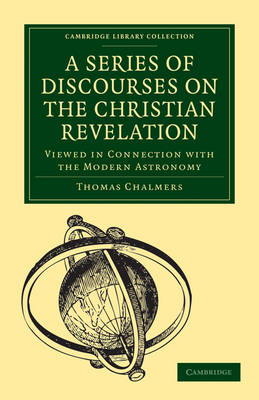
A Series of Discourses on the Christian Revelation, Viewed in Connection with the Modern Astronomy
Seiten
2009
Cambridge University Press (Verlag)
978-1-108-00527-2 (ISBN)
Cambridge University Press (Verlag)
978-1-108-00527-2 (ISBN)
This book by Thomas Chalmers (1780–1847) is based on a series of sermons in which he contested the notion that the immensity of the universe means God would not care about humanity. He urges Christians to embrace science, but also reminds them of the need to live a moral life.
In 1817 the Scottish mathematician and churchman Thomas Chalmers (1780–1847), who was later invited to write one of the Bridgewater Treatises (also reissued in this series) published this book, based on weekday sermons preached by him in Glasgow. His main aim is to refute the 'infidel' argument that because the earth and humanity are such insignificant parts of the universe, God - if he existed - would not care about them. However, he is also addressing the 'narrow and intolerant professors' who 'take an alarm' at the idea of philosophy rather than incorporating science into their Christian preaching. Chalmers writes from the viewpoint of an admirer of science and modern astronomy. However, he also argues that wonder at the magnificence of creation and even acknowledging it as God's work is not enough, and that a truly moral Christian life is essential for salvation.
In 1817 the Scottish mathematician and churchman Thomas Chalmers (1780–1847), who was later invited to write one of the Bridgewater Treatises (also reissued in this series) published this book, based on weekday sermons preached by him in Glasgow. His main aim is to refute the 'infidel' argument that because the earth and humanity are such insignificant parts of the universe, God - if he existed - would not care about them. However, he is also addressing the 'narrow and intolerant professors' who 'take an alarm' at the idea of philosophy rather than incorporating science into their Christian preaching. Chalmers writes from the viewpoint of an admirer of science and modern astronomy. However, he also argues that wonder at the magnificence of creation and even acknowledging it as God's work is not enough, and that a truly moral Christian life is essential for salvation.
1. A sketch of the modern astronomy; 2. The modesty of true science; 3. On the extent of the divine condescension; 4. On the knowledge of man's moral history in the distant places of creation; 5. On the sympathy that is felt for man in the distant places of creation; 6. On the contest for an ascendency over man, amongst the higher orders of intelligence; 7. On the slender influence of mere taste and sensibility, in matters of religion.
| Erscheint lt. Verlag | 24.9.2009 |
|---|---|
| Reihe/Serie | Cambridge Library Collection - Science and Religion |
| Zusatzinfo | Worked examples or Exercises |
| Verlagsort | Cambridge |
| Sprache | englisch |
| Maße | 140 x 216 mm |
| Gewicht | 360 g |
| Themenwelt | Naturwissenschaften ► Biologie ► Evolution |
| ISBN-10 | 1-108-00527-6 / 1108005276 |
| ISBN-13 | 978-1-108-00527-2 / 9781108005272 |
| Zustand | Neuware |
| Haben Sie eine Frage zum Produkt? |
Mehr entdecken
aus dem Bereich
aus dem Bereich
Wie die Vernichtung der Arten unser Überleben bedroht - Der …
Buch | Softcover (2023)
Penguin (Verlag)
15,00 €


